By Ahmed Al Araifi, Cody Portin and Alice Vincent
UCL School of Public Policy, 4th November 2013, 4pm
With Malik Dahlan, President at the iPlatform for Global Change (“the iPlatform”) and Chief Lawyer at a law firm based in the Middle East;
and Professor David Mednicoff, Director and Chairman of the iPlatform Committee of Academic Fellows and Professor of Public Policy and Director of the Middle Eastern Studies Program at the University of Massachusetts-Amherst
As students in the UCL School of Public Policy and on behalf of UCL we thanked Mr. Dahlan and Professor Mednicoff for taking time to allow us to conduct an interview and for choosing UCL as the place to launch their exciting new initiative: the iPlatform.
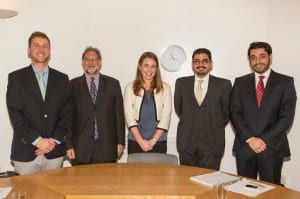
Cody Portin, David Mednicoff, Alice Vincent, Malik Dahlan and Ahmed Al Araifi
iPlatform
The iPlatform is an independent, not for profit, innovation platform for law and policy, connecting diverse generations of leaders and scholars and providing opportunities for young people, academics, and other thinkers, across universities, organisations and institutions around the world, to develop global thought leadership and cutting edge research and practical solutions to law and policy challenges.
There is an abundant amount of organizations that are concerned with global governance, law and policy research worldwide. What makes the iPlatform different?
Malik Dahlan: We are really motivated by a generational dialogue that has been missed by most organizations you have described. Events that occurred in 2011 in the so-called Arab Spring or the English Riots or even the Occupy Wall Street Movement spoke about something much deeper and I think David (Prof. Mednicoff) and I and our friends in the organization, while connected to many academic institutions, think tanks and other international organizations, realized that the real problem is that we are not engaging with those who actually have ownership of the problem. We need youthful thinking to surface as it should and the iPlatform is open to all for that thinking to surface.
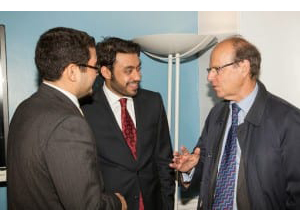 Professor Mednicoff: Malik and I have been thinking about the iPlatform for several years and we have a vision for not necessarily a large entity but a small flexible organization that really focuses on being highly transnational with the potential to connect institutions, academic powerhouses and other organizations. We aspire to be truly global. We are an open platform and we have several places where anyone can contribute an idea. We are launching a competition today that reflects our commitment to the empowerment of youth and encourages innovation in the field of policy research.
Professor Mednicoff: Malik and I have been thinking about the iPlatform for several years and we have a vision for not necessarily a large entity but a small flexible organization that really focuses on being highly transnational with the potential to connect institutions, academic powerhouses and other organizations. We aspire to be truly global. We are an open platform and we have several places where anyone can contribute an idea. We are launching a competition today that reflects our commitment to the empowerment of youth and encourages innovation in the field of policy research.
Can you elaborate on the membership and governance structure of the iPlatform?
Malik Dahlan: One point we’re focused on in terms of governance is to have representation from academia, policy-makers, business and government. The committee of fellows is the academic committee in charge of programming, and another level is the Global Advisors who want to be affiliated, associated or contribute to the iPlatform and mentoring of young persons. Professor Mednicoff: We have an evolving academic fellows group. The priorities for people to be in this group are:
- that they are committed to diverse, open multidisciplinary, high quality research that brings together academia and policy experts;
- to be globally diverse; and
- to be genuinely interested in incubating projects by combining enthusiastic students and established policy experts and academic networks.
We aim to free up academic networking and are unified by globalism and real commitment to bringing projects that can hopefully inspire people like you to join up and collaborate with us.
How are policy projects chosen, submitted, and worked through?
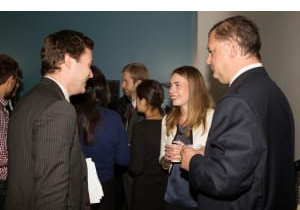 Professor Mednicoff: It is best to use our new iLab which is a major part of the iPlatform or to work through the website. Students need not worry if a policy project is not precisely in the iPlatform’s area of expertise because through us they have access to many networks and we want to free up academic networking. As a very open, and transnational organization, there are many contacts and networks that the iPlatform can utilize to make connections and introductions, using networking and mentorship programmes for projects they feel have substance.
Professor Mednicoff: It is best to use our new iLab which is a major part of the iPlatform or to work through the website. Students need not worry if a policy project is not precisely in the iPlatform’s area of expertise because through us they have access to many networks and we want to free up academic networking. As a very open, and transnational organization, there are many contacts and networks that the iPlatform can utilize to make connections and introductions, using networking and mentorship programmes for projects they feel have substance.
The iPlatform is very keen on the empowerment of youth and creating opportunities for them. Can you tell us how this will be done? Moreover, the iPlatform has strong relationships with a number of academic institutions of the highest caliber. How will these relationships be utilized to pursue your objectives?
Malik Dahlan: The empowerment of youth is a very important aspect for the iPlatform. Their empowerment can be through various elements we strive to provide such as internships, scholarships and bursaries. Moreover, later today we will be launching, alongside the iPlatform, a competition that revolves around policy research and the engagement of youth with the policy world. We will provide prizes and will also publish the selected policy proposals. As to our relationship with the institutions you mentioned, we aim to facilitate, through them, a connection and link that will enable all members of our organization specifically and the global youth generally a chance to communicate effectively. We believe that a number of the problems that exist today exist because of miscommunication and through our relationships we aim to connect the good to the better and the inexperienced to the experienced and so on.
There is a lot of focus at the iPlatform on the Middle East, both in terms of content and members. What are the differences or similarities that you see with the rest of the world in terms of the rule of law?
Professor Mednicoff: We do not mean to be particularly or exclusively focused on the Middle East but Arab countries are currently so much in the western consciousness and so intertwined with our global challenges. We should not ignore the importance of current events in the Middle East and the connected aspects of global debate. We are fortunate to have particular contacts and expertise with respect to that region and it is a matter of political obligation to try to do what we can. If we could do something towards eventual Syrian reconstruction, then we would feel we were making a useful contribution.
For more information visit the iPlatform website
About Malik Dahlan and Professor David Mednicoff
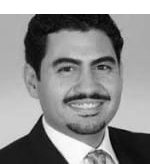 Malik Dahlan is President of the iPlatform Board of Overseers. He is also the iPlatform Founder and Chief Lawyer at a Qatar based law firm. He has held numerous distinguished posts, including as a Regional Expert in Constitutional Affairs, Oil and Gas, selected by the UN Assistance Mission for Iraq. He was founding Director of the Qatar Law Forum of Global Leaders in Law, and advised on the establishment of the QFC Civil and Commercial Court and Regulatory Tribunal. He serves on the World Economic Forum’s Global Agenda Council on the Future of the Middle East, and he is a fellow of the British Institute of International and Comparative Law. He was the founding President of the Harvard Law School Association of Arabia, and is the Chairman of the Harvard Law School International Alumni. He was awarded an LLB from the University of Cairo, an MA in Government and Middle East Studies at the Harvard University Kennedy School of Government, and an LLM at Harvard University School of Law.
Malik Dahlan is President of the iPlatform Board of Overseers. He is also the iPlatform Founder and Chief Lawyer at a Qatar based law firm. He has held numerous distinguished posts, including as a Regional Expert in Constitutional Affairs, Oil and Gas, selected by the UN Assistance Mission for Iraq. He was founding Director of the Qatar Law Forum of Global Leaders in Law, and advised on the establishment of the QFC Civil and Commercial Court and Regulatory Tribunal. He serves on the World Economic Forum’s Global Agenda Council on the Future of the Middle East, and he is a fellow of the British Institute of International and Comparative Law. He was the founding President of the Harvard Law School Association of Arabia, and is the Chairman of the Harvard Law School International Alumni. He was awarded an LLB from the University of Cairo, an MA in Government and Middle East Studies at the Harvard University Kennedy School of Government, and an LLM at Harvard University School of Law.
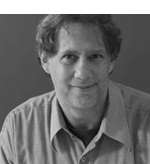 Professor David Mednicoff is Chairman of the iPlatform Committee of Academic Fellows. He is also the iPlatform Director and Senior Academic Fellow, and Director of Middle Eastern Studies and a Professor of Public Policy at the University of Massachusetts – Amherst. He is a scholar of the rule of law, politics and public policy in the Middle East and elsewhere. He has received various teaching honors including a university-wide Lilly Teaching Fellowship and a US national prize for innovative teaching related to the US after 9/11. He was a Fulbright Senior Scholar in law in Qatar in 2006-2007 and a Research Fellow in 2010-2011 in the Dubai Initiative at the Kennedy School of Government at Harvard University. He was awarded a BA from Princeton University and an MA, JD and PhD from Harvard University.
Professor David Mednicoff is Chairman of the iPlatform Committee of Academic Fellows. He is also the iPlatform Director and Senior Academic Fellow, and Director of Middle Eastern Studies and a Professor of Public Policy at the University of Massachusetts – Amherst. He is a scholar of the rule of law, politics and public policy in the Middle East and elsewhere. He has received various teaching honors including a university-wide Lilly Teaching Fellowship and a US national prize for innovative teaching related to the US after 9/11. He was a Fulbright Senior Scholar in law in Qatar in 2006-2007 and a Research Fellow in 2010-2011 in the Dubai Initiative at the Kennedy School of Government at Harvard University. He was awarded a BA from Princeton University and an MA, JD and PhD from Harvard University.
The original article was published here

